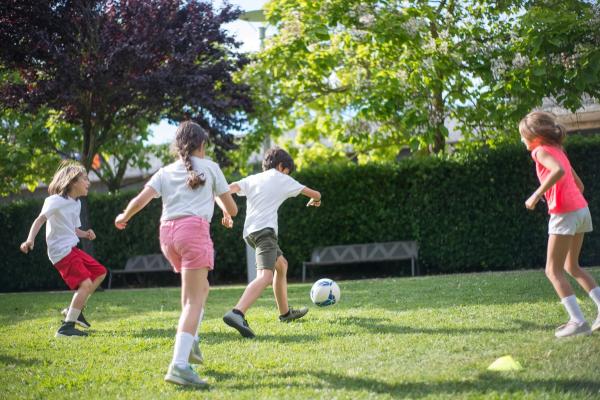By subscribing you are agreeing to our Privacy Policy
Enhancing your child's memory skills: Unlocking academic success

Memorizing skills play a crucial role in a child's academic performance and overall cognitive development. As parents, we have the power to support and enhance our children's memory abilities, equipping them with valuable tools for success in school and beyond. In this blog post, we will explore effective strategies and activities to help improve children's memory skills. Whether your child struggles with retaining information or you simply want to sharpen their memory, these techniques will provide valuable insights. Let's embark on this journey of unlocking your child's memory potential together!
Why Memorizing Skills Are Important for Children
Having strong memory skills significantly impacts various aspects of a child's life. By developing effective memory techniques, children can excel in learning, problem-solving, and retaining information. Numerous studies 1 have linked improved memory skills to enhanced learning abilities and higher academics. It is clear that investing in memory development is key to unlocking a child's full cognitive potential.

In the context of the traditional local school system in Hong Kong, the reliance on memorization continues to be a significant factor in exam performance, particularly in the Diploma of Secondary Education (DSE) and other public examinations. The educational culture in the region has long emphasized rote memorization as a key component of academic success. While there are arguments regarding the limitations of this approach in fostering critical thinking and creativity, it is undeniable that these examinations hold immense influence in shaping a student's future opportunities. As parents, it becomes even more vital for us to equip our children with effective memory skills, considering that their success within this system relies heavily on their ability to retain and recall information. By providing them with the necessary tools and techniques to enhance their memory, we empower them to excel academically and navigate their overall educational journey with confidence.
The Role of Parents in Enhancing Children's Memory Skills
Parents play a vital role in nurturing and supporting their children's memory development. By actively engaging with their child's learning journey, parents can significantly influence memory enhancement. Numerous research studies have shown that the positive impact of parental involvement and engagement on a child's memory skills 2. Together, we can create an environment that fosters optimal memory development.

There are several activities for parents to improve children’s memory skills:
1. Engage in Regular Memory Boosting Games
Playing memory games like "Simon Says" or "Memory Match" with your child not only makes learning fun but also improves their memory retention and cognitive abilities. Through these enjoyable activities, children develop focus, attention, and the ability to recall information accurately.
2. Create Mnemonic Devices
Teach your child mnemonic techniques such as acronyms or visualization. These tools help children remember complex information more effectively. By associating information with vivid mental images or creating memorable phrases, children can retrieve and retain knowledge with ease.
3. Encourage Regular Reading
Reading regularly enhances memory and comprehension skills. Encourage your child to explore books, articles, and engage in storytelling activities. As they immerse themselves in different narratives, their memory capacity expands, and they develop a deeper understanding of the world around them.
4. Practice Chunking Technique
The chunking technique involves breaking down complex information into smaller, manageable chunks. By organizing information into meaningful clusters, children can remember and recall details more easily. Encourage your child to identify key patterns or groupings within the material they are learning, promoting efficient memory retrieval.
5. Use Multisensory Learning
Engaging multiple senses during learning activities enhances memory encoding and retrieval. Encourage your child to interact with learning materials using sight, hearing, and touch. For example, they can draw diagrams while studying or use manipulatives to reinforce concepts. This multisensory approach stimulates different parts of the brain, optimizing memory formation.
By understanding the importance of memory skills and embracing our role as parents, we can empower our children to thrive academically. Implementing the tips and activities discussed in this blog post, such as memory-boosting games, mnemonic devices, regular reading, chunking, and multisensory learning, will lay the foundation for your child's memory development.

Meanwhile, engaging in sports activities has been found to have a positive impact on the memory of children. Regular participation in physical exercise not only improves physical health but also contributes to cognitive development. Research has shown that physical activity stimulates the brain, leading to increased blood flow and the release of certain chemicals that support memory and learning processes. Sports activities involve various elements such as coordination, strategy, and quick decision-making, which can enhance cognitive functions including memory retention and recall.
On the Bizibuz platform, there are a lot of sports activities that help your kids improve their memory.
Browse our list of regular sports courses for children
Check out all the FREE TRIAL sports classes
Let's embark on this journey together, equipping our children with invaluable skills that will shape their academic success and beyond. Remember, a well-trained memory opens doors to endless possibilities!
Reference:
1. Tashauna L. Blankenship, Meagan O'Neill, Alleyne Ross, Martha Ann Bell, Working memory and recollection contribute to academic achievement, Learning and Individual Differences, Volume 43, 2015, Pages 164-169, ISSN 1041-6080, https://doi.org/10.1016/j.lindif.2015.08.020. (https://www.sciencedirect.com/science/article/pii/S1041608015001855)
2. Jannet Alicia Sialer Alarcón, María del Pilar Bustamante de Ordinola, Child Neurodevelopment and Parental Involvement in the Educational Process, https://www.redalyc.org/journal/5732/573270925003/html/



